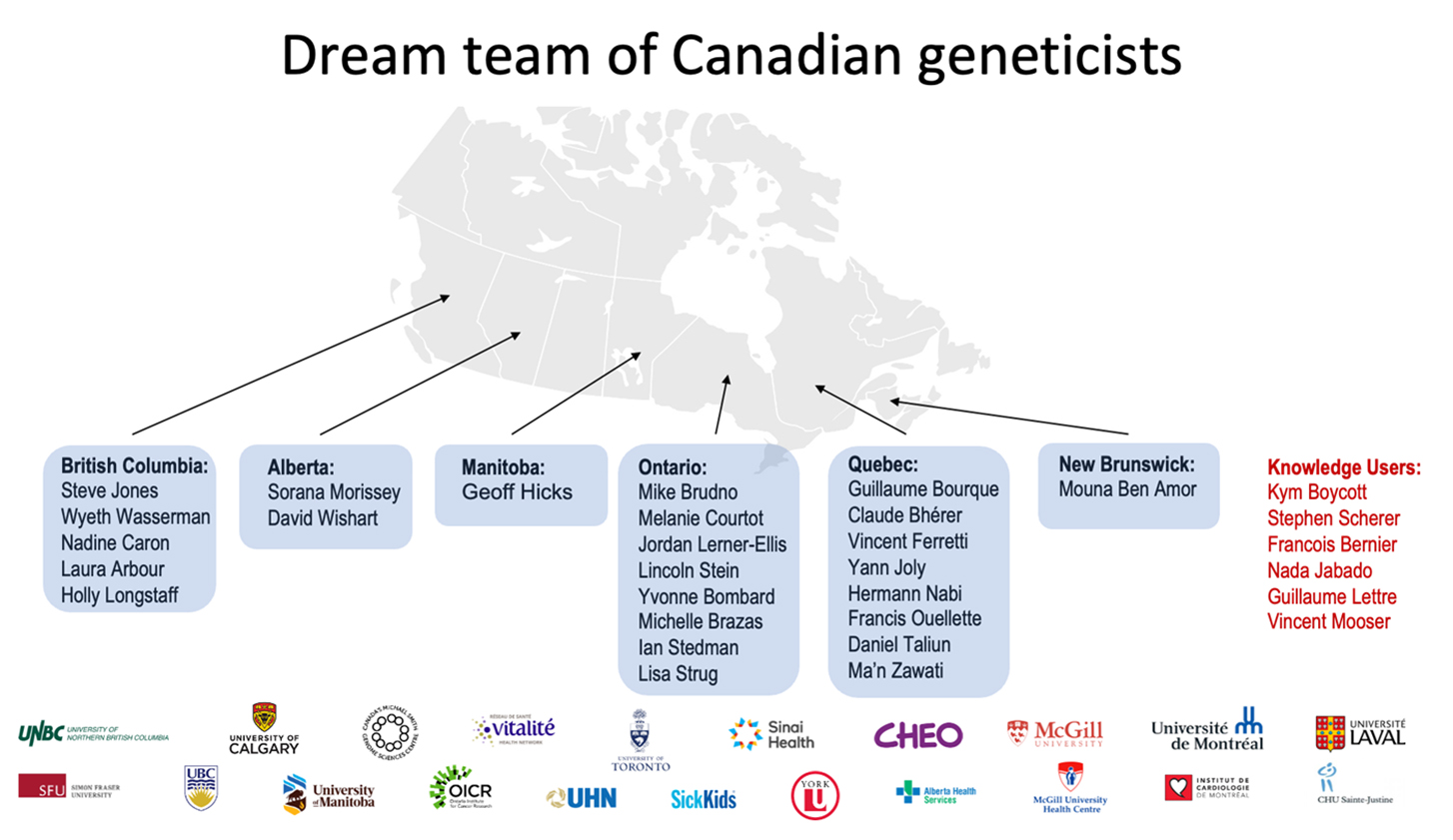Pan-Canadian Genome Library: Dr. Guillaume Bourque and his team receive $15 million to create a first-of-its-kind genome library
Canada is at the forefront of genomics—the study of all of a person’s or population’s genes. This involves sequencing genomes to identify mutations that are key to helping researchers and health professionals understand the causes of disease. Sequencing technologies are rapidly advancing, becoming faster and more cost-effective, and are being increasingly incorporated into health care and medical record-keeping.
Funding programs by the Canadian Institutes of Health Research (CIHR), Genome Canada, the Canadian Institute for Advanced Research, and other projects such as those from the Terry Fox Foundation, have supported human genome sequencing projects. However, the siloed storage of genomic data from these projects impedes fast and large-scale analysis. Adopting a unified approach to storing and analyzing Canadian genomic data can pave the way for new discoveries and maximize our ability to capture the richness of the Canadian genomic diversity.
The Pan-Canadian Human Genome Library is the next step in genomics advancement—a national database of genomic data supported by a $15M grant from CIHR and partners. Collaboration with CGEn HostSeq, the Digital Research Alliance of Canada, Care for Rare, Terry Fox Research Institute (Marathon of Hope), Genome Canada (All for One), and McGill University is vital to the launch and success of the Library.
Part of the Library’s goal is to provide resources for researchers to understand the contribution of genomics to various diseases ranging from childhood inherited disease to polygenic risk scores to predict predispositions to cancer, heart disease and stroke, diabetes, infectious disease, neurological disease, and mental illness. This will enable the establishment of a ‘real time’ learning precision health care system, allowing for more personalized treatment of individual patients and contributing to the discovery of new treatments and potential cures for medical conditions.
Collecting all human genome sequencing efforts in Canada under one roof will give researchers access to an unprecedented amount of genomic data for analysis. The Library will support the development of governance measures to ensure that the data reflects the rich diversity of people living in Canada. This will ensure that anyone living in Canada, no matter their ethnic background or genetic makeup, can benefit from promising scientific advancements.
Diversity and inclusivity at the core

Dr. Guillaume Bourque
Professor, Human Genetics, McGill University
"Over the last two decades, billions have been invested in genomics in Canada and the potential impact on medicine for the country is immense. The Genome Library aims to realize this potential by organizing and sharing genomic data efficiently and ethically to support research and the clinical care of people across Canada.”
The Library follows a responsibly governed framework aligned with Global Alliance for Genomics and Health (GA4GH) principles for data sharing. It is also fully aligned with the Tri-Agency Research Data Management Policy in that the library integrates the Findability, Accessibility, Interoperability, and Reuse of digital assets (FAIR) guiding principles and a strong Indigenous Peoples governance, ensuring that they have self-determination over their genomic data to ensure collective benefits.
Accelerating rare disease diagnosis and treatment
By linking the data with the genomic diversity of people living in Canada, the Library will reduce the amount of time it takes to diagnose and treat rare diseases, equitably improving the lives of all those living with rare conditions. This will further improve the impact of the Government of Canada investments made through the Drugs for Rare Diseases Strategy, in particular those aiming to establish registries, improve data sharing, and provide better clinical care and treatment.
Dr. Guillaume Bourque and his team of geneticists are driving the vision of a national federated genomic data resource in Canada.
Dr. Bourque has a distinguished record of successful work in bioinformatics, genomics, and epigenomics. He is the head of the Canadian Centre for Computational Genomics, a Canada Research Chair in Computational Genomics and Medicine, and leads the McGill initiative in Computational Medicine. He also leads the Epigenomics Mapping Center at McGill, funded by CIHR through the Canadian Epigenetics, Environment and Health Research Consortium. This work is part of the Canadian contribution to the International Human Epigenome Consortium, and involves the production of reference epigenomes, and the development of standardized workflow and data analysis and sharing tools. Two of his projects, CanDIG and EpiShare, have been selected as Driver Projects by the Global Alliance for Genomics and Health.

Long Description
Starting in the western provinces, Drs. Steve Jones, Wyeth Wasserman, Nadine Caron, Laura Arbour, and Holly Longstaff are located in British Columbia. In the prairie provinces, Drs. Sorana Morissey and David Wishart are in Alberta, and Dr. Geoff Hicks is in Manitoba. In central Canada, Drs. Mike Brudno, Melanie Courtot, Jordan Lerner-Ellis, Lincoln Stein, Yvonne Bombard, Michelle Brazas, Ian Stedman, and Lisa Strug are in Ontario, while Drs. Guillaume Bourque, Claude Bhérer, Vincent Ferretti, Yann Joly, Hermann Nabi, Francis Ouellette, Daniel Taliun, and Ma’n Zawati are in Quebec. In the Maritimes, Dr. Mouna Ben Amor is in New Brunswick.
The knowledge users involved with the Library are Drs. Kym Boycott, Stephen Scherer, Francois Bernier, Nada Jabado, Guillaume Lettre, and Vincent Mooser located across Canada.
- Date modified: